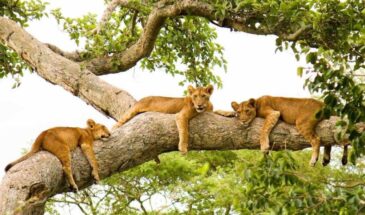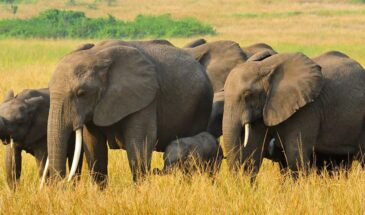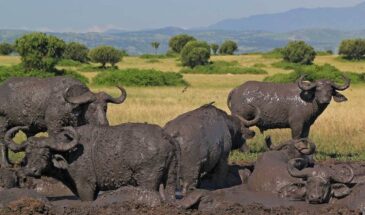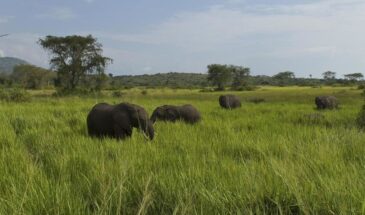- Overview
- Trip Outline
- Trip Includes
- Trip Excludes
- Gallery
- Booking
- FAQ
Through jungle, savannah, spectacular mighty falls and lakes we
track the animals that make Uganda unique. If chimp tracking doesn’t take
your breath away, perhaps the hundreds of hippo crowding the banks of the
Kazinga Channel will. If that’s not good enough, try the lions, mountain
gorillas at Bwindi or mgahinga. If that doesn’t do it … we welcome suggestions.
Through jungle, savannah, spectacular mighty falls and lakes we
track the animals that make Uganda unique. If chimp tracking doesn’t take
your breath away, perhaps the hundreds of hippo crowding the banks of the
Kazinga Channel will. If that’s not good enough, try the lions, mountain
gorillas at Bwindi or mgahinga. If that doesn’t do it … we welcome suggestions.
Itineraries
Day 1
Arrival
This day of arrival you will be met by your guide at Entebbe international airport where you will be given a briefing about Uganda and possibly if time allows and arrangements are made you will be able to visit the old airport where Israeli hostages were detained later you transfer to your hotel for a night (prior arrangements/clearance needed in order to visit the old airport)
Day 2
Kampala – Murchison Falls National Park
Early in the morning after your breakfast you will be met by your professional guide/ Drivers who will transfer you to Murchison (BEN) Transfer to Murchison Falls National Park via Ziwa Rhino Sanctuary Leave Kampala in the morning for the start of your Murchison Falls national park safari. Along the way we stop at Ziwa Rhino sanctuary where they are working at reintroducing Rhinos to Uganda. Here you go for a trek to see these impressive animals. Have lunch along the way and continue on to Murchison falls overnight pakuba safari lodge midrange
Day 3
Murchison Falls National Park
A full day of game viewing at Murchison. We begin with a morning game drive, on the lookout for elephant, buffalo, giraffe, and different species of antelopes, lion, leopard and jackal. If luck is on our side, we may encounter one of Murchison’s elusive leopards. And we shall return to the hotel for lunch and relax a bit and quick swimming before going back for evening drive In the afternoon we shall go back again for another game drive this will give us a chance to explore Murchison well and try all our opportunities in the jungle with a beautiful sunset in the park overnight pakuba safari lodge.
Day 4
Murchison Falls National Park
We begin with a morning game drive, on the lookout for elephant, buffalo, giraffe, patus monkeys, lion, leopard and jackal. If luck is really on our side, we may encounter one of Murchison’s elusive leopards here we shall. Come back for our hot lunch, in the afternoon we take a boat trip to the base of the 43m high falls. This is also a good opportunity to spot a few of Murchison’s 460 bird species. You will also see one of Africa’s densest hippo and crocodile populations. The boat will drop you at the bottom of the falls and you will walk/hike to the top of the falls with a ranger where your guide will pick you from before coming back to the hotel for your overnight Pakuba safari lodge
Day 5
Murchison Falls National Park – Kibale National Park
Murchison - Kibale. This is true of most Uganda safari tours, regardless of the tour operator. What vary are the tour duration and the focus, whether it is on primates, large mammals, birds or general. And so we continue our primate investigation by heading to the dense forests of Kibale in southwest Uganda. This national park contains the greatest variety and concentration of primates in Africa. We stop at Fort Portal for lunch on the outskirts of the national park ‘and make our base for the night at Chimpanzee guest house
Day 6
Kibale National Park
Day 6 is spent in Uganda’s most accessible rainforest, Kibale. With 13 primate species (the highest concentration and variety of primates in Africa), viewing here is fantastic. Look out for L’Hoest’s monkeys, red colobus, black-and-white colobus, red- tailed monkeys and grey-cheeked mangabeys. Our main activity however is chimpanzee tracking, which will take us into the forest as we follow the rapidly moving chimps for most of the morning. The afternoon is focused on the great birdlife in Kibale, hoping to spot some of its endemic species as we visit the Bigodi Wetland Sanctuary for a walk. You will visit the community and see the different ways of leaving. Chimpanzee forest guest house
Day 7
Kibale National Park – Queen Elizabeth National Park
This is a lazy morning you will wake up for your morning breakfast after we transfer to Queen Elizabeth National Park and straight on to a late evening game drive. This incredible park hosts over 97 mammal and 612 bird species and is the pride of Ugandan safari. Our drive through the northern sector will typically encounter elephant, lion, Uganda kob, waterbucks here we shall concentrate on the volcanic crater lakes our main aim is the scenery we shall visit the katwe explosion craters where salt exploration is done in a typical local way this happened due to volcanic explosion in between 500-800ADlater we shall go back to hotel overnight Twin lakes midrange
Day 8
Queen Elizabeth National Park
The day begins early as we head to the mating ground of the Uganda kobs. We
search for lions, elephants, buffaloes and other wild animals in their natural habitat,
before returning for lunch. In the afternoon you will have the opportunity to stretch
your legs. After lunch we take on a boat cruise along the Kazinga Channel, a natural channel between Lake Edward and Lake George. Thanks to the elephants, buffaloes and hundreds of hippos, this cruise will definitely be one of the highlights of your safari. Dinner and overnight at Twin lakes
Day 9
Queen Elizabeth National Park – Ishasha
We transfer to Queen Elizabeth’s southern Ishasha sector in the morning. This is a dry and wild savannah region, much less developed than the Mweya peninsula. The game viewing is very good and in particular the region is famed for its tree-climbing lions. we shall spend our evening looking for the tree climbing lions and other animals overnight ENJOJO LODGE
Day 10
Ishasha – Bwindi National Park
We make a morning tour of the Ishasha sector, in the hope of seeing more tree climbing lions and the elusive leopard. Then we say goodbye to Queen Elizabeth and head down to Bwindi Impenetrable National Park and prepare for the next day.Bakiga lodge
Day 11
Bwindi National Park
The highlight of many safaris – gorilla trekking in Bwindi National Park (subject to permit availability at the time of booking). This can take up the whole day and can be very tiring – the ground is steep and densely forested – but it really worth it. Treks can take an hour or they can take the whole day – it all depends on where the gorillas are. And so the time remaining after visiting the gorillas can either be spent relaxing and remembering the trek or hiking in the foothills and visiting local communities – it’s up to you (optional). Lake Bunyonyi rock resort
Day 12
Lake Bunyonyi – Lake Mburo National Park
Today is perhaps the only lie-in of the tour, and you have a chance to recuperate your energies a little before we set off to Lake Mburo.
This beautiful drive takes approximately 5 hours and allows time for an afternoon game drive in the splendor of Lake Mburo. The acacia forests and wetlands are home to an impressive variety of antelope including the giant eland and impala. Kimbla mantana Tented camp
Day 13
Lake Mburo National park
Our morning nature walk through the humid and haunting acacia forests gives yet another aspect to Uganda’s beauty and will hopefully provide us with zebra, hippo, leopard, bushbuck and Elands and topi In the afternoon we take a splendid boat trip across Lake Mburo and enjoy some excellent bird watching. There are also chances to see crocodiles, waterbuck and the rare sitatunga before we make our evening drive in search of animal’s overnight kimbla mantana tented camp
Day 14
Transfer to Kampala
We finish the tour with enjoying our last breakfast at the hotel before checking out here we drive have a stop at equator where you will be able to do some shopping and take pictures at a latitude of 0 degrees and have lunch before proceeding to the airport or hotel of the choice This day which is really difficult to say bye-bye and it will be the end of our trip overnight at lake heights Entebbe
- Airport pick up and transfer to the hotel and at the end of the tour
- Visa Fee
- Accommodation on the first night
- 1 gorilla permits
- 1 chimpanzee permits
- 3 times Boat cruises
- Full board accommodation all meals covered
- Bottled water
- Park entrance fees-game drives
- Ranger fees
- English speaking driver/guide
- Customized vehicle(van) for a safari
- Fuel
- Air fares
- Insurance
- Soft or alcoholic drinks
- Porterage or laundry
- Mineral water excluding that offered in the vehicle, any meals, accommodations and tours not included in the itinerary (before and after the tour) tips to local guides and finally items of personal nature.
All safari guests must carry a passport that is valid for six months beyond the intended length of stay. The East African governments require visitors to purchase visas. It is recommended you purchase your visa in advance but you purchase one on arrival at entry points. Check with your consulate for the latest visa and entry requirements.
You are required to purchase a tourist visa before you enter Uganda. Tourist visas can be bought in advance via the embassy or consulate in your country or simply purchased upon arrival at Entebbe International Airport or at any overland border. Photos are not required and a single entry tourist visa costs US$ 100 per person for up to 90 days stay in Uganda.
If you are planning to combine Uganda with a visit to Rwanda or Kenya it is recommendable to request for the East African Tourist Visa instead of a single entry visa. This special visa costs US$175 per person plus service fee and allows a 90-days multiple entry to Uganda, Rwanda and Kenya. Regretfully, Tanzania is not (yet) a member of the East African community and therefore not part of this special visa arrangement
While communications in remote tented camps will be limited, most major hotels and lodges offer Internet services as well as international telephone services. Additionally, private communication centers and cyber cafes in larger towns enable tourists to stay connected. Some centers may close on Sundays and public holidays.
The cellular networks in safari destinations cover most large towns and tourist areas.
Credit cards are accepted in hotels, camps, lodges and major cities and towns, but are not widely accepted elsewhere. Local currency can be drawn against Visa and other major credit cards at selected ATMs in Kampala, at Entebbe International Airport, and in a few other large towns
Banks in Uganda are generally open from 9am to 3pm Monday to Friday, and 9am to 12noon on Saturdays. Some banks are open later.
The official currency is the Uganda shilling. The US dollar is traditionally the hard currency of preference, but euro and pound sterling are also widely accepted. Most hotels and camps accept Credit/Debit cards. US dollar notes that are older than year 2000 are not accepted everywhere and can be very difficult to exchange. Major currencies such as the dollar and the euro are easily exchanged at the airport, banks and private bureau de change in all large towns, but traveler's checks are not widely accepted outside Kampala.
Basic precautions should be taken in all countries. Tour guides are highly experienced in navigating each destination, but visitors should always be aware of their surroundings, especially in any rural villages that may be wary of foreigners. In less-developed countries where many people live in poverty, crimes of opportunity can occur, such as petty theft. Visitors are advised to stay alert and use common sense. Safari guests should limit the amount of cash they carry and lock valuables in a hotel safe or other secure place. Lock hotel rooms when you leave. Do not walk alone in deserted areas at night. Take extra care of purses, bags and wallets in crowded places such as malls and nightclubs.
The drier months from June to August and December to February are the best time for wildlife watching trips to Uganda. There’s also plentiful sunshine at this time. In the wetter months, there’s the possibility that rain will cut off roads and wash out your primate trekking adventure. Primate walks in the forest are a big part of any safari in Uganda. The habitat of rainforests are, by default, very wet, and one can't avoid rain completely. However, after heavy rain, the skies often open up to bright sunshine.
Uganda is generally a very safe country for travelers. Ugandans are considered among the friendliest and most welcoming people on planet earth. Feel free to meet and talk to Ugandans, as they will be most honored.
Kampala, the capital city of Uganda is known to be one of the safest in Africa, but just like any country you visit, it’s advisable to always be cautious when traveling in any city.
In the National parks and other tourist hotspots, park rangers and the Uganda Tourism Police are working in liaison with other security organs to ensure security of person and property of visitors as well as the Nationals.
Most tailor made safaris are best on choice depending on what the client will have chosen. Uganda has various hotels ranging from Budget to up market luxury accommodation. Budget accommodation consists of simple and basic rooms, Banda or tents, providing double or twin beds and mosquito nets where necessary. In some facilities where private bathrooms aren’t available, public showers and toilets/pit latrines are used. Hot water is not guaranteed. Luxury accommodations are 4 or 5 star lodges, providing comfortable rooms or luxury furnished tents and a private bathroom. Flush toilets as well as hot and cold running water will be available.
It is best to book as far in advance as possible (at least 3-6 months), as some safaris (like gorilla trekking) sell out months ahead of their departure dates. This is especially important for those planning to travel during peak seasons (June to August and December to February) and for those adding extensions to scheduled trips.
Tourists are normally transported in 4WD Toyota Hiace minibuses or Land Cruisers with pop up safari roofs with plenty of leg room and comfort while game viewing. For smaller groups land cruisers can be arranged. For larger groups, coaster buses can also be arranged.
Subject to health/fitness, any one above 15 years can partake in gorilla trekking. However, you can only confirm tracking gorillas only if you have a permit. The permits are issued on first come first serve basis on cash payment. Eight people are allowed per day in each gorilla group to track. In order to be able to buy the gorilla permit you have to provide your ground operator with your full names, nationality and passport number.
Light wear during the travel days; good hiking boots, sun hat, sweat band, long sleeved shirts/blouses & gloves for tracking gorillas & chimpanzee, rain gear, body cream and sun glasses. Most up market lodges have swimming pools, so remember your swim suits! We advise you to also carry a sweater or coat as some places may be cold in the evenings, especially in Bwindi, Mgahinga, Lake Bunyonyi (Kabale).
With Uganda being located within the tropical altitude, it’s advisable you take malaria prevention medications, as well as vaccination against yellow fever which is mandatory. Immunizations against DTP (Diphtheria, Tetanus and Polio) and Hepatitis A are recommended too, and this is required before you enter Uganda. Besides vaccination you are advised to bring insect repellent, for emergency carry a mosquito net in your bag, though there are mosquito nets in most hotels and lodges across the country.






